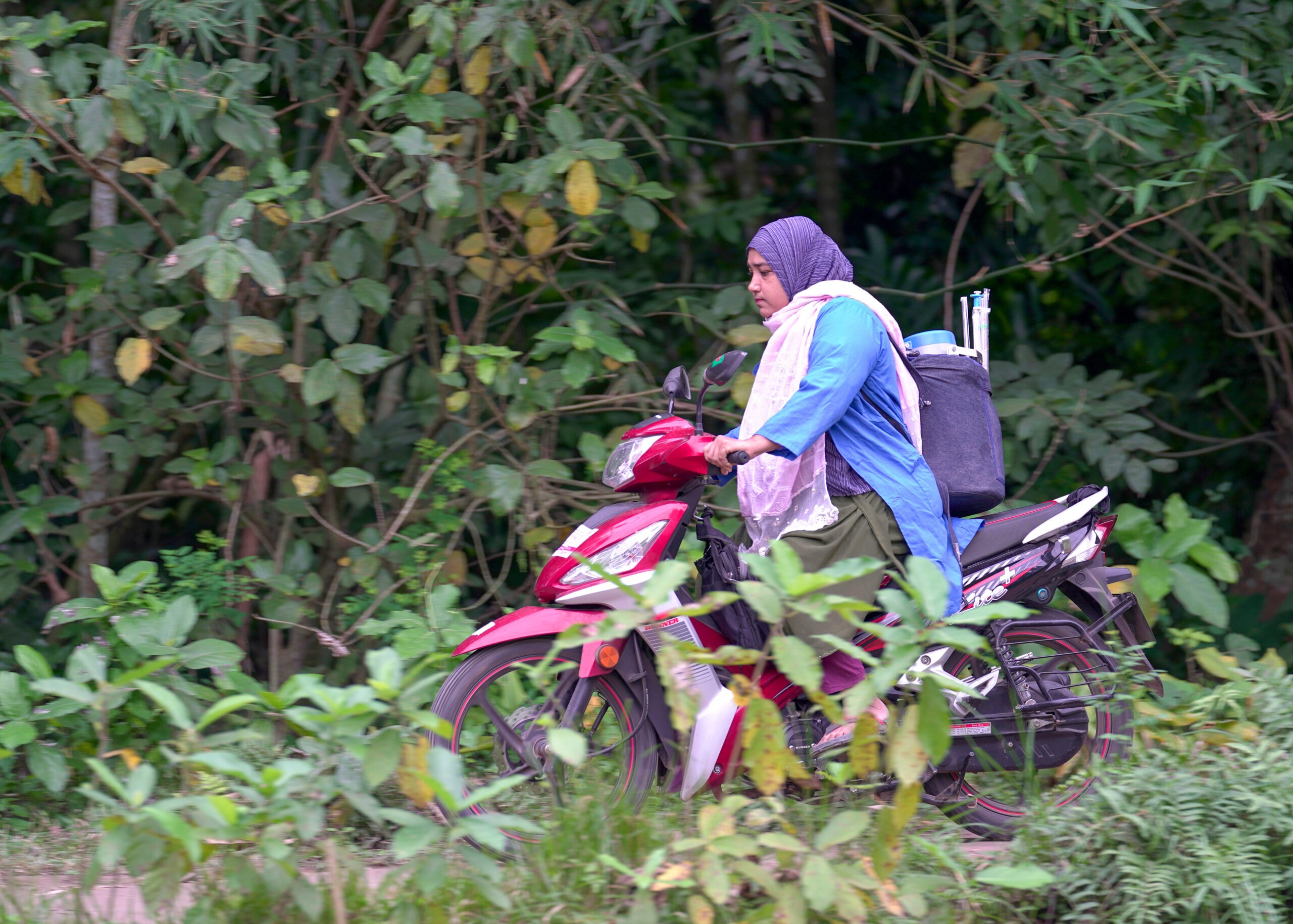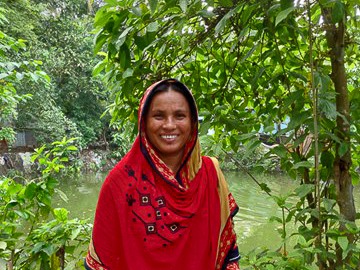
Meet Nilufar, a successful artificial insemination (AI) service provider in the Jashore District of Bangladesh. Her journey to becoming an AI service provider was not always easy. Cultural and social norms and gender stereotypes often prevent women in rural Bangladesh from taking on these types of roles in the livestock industry. Barriers around accessing information and resources often exclude women from being the ones to provide these essential services. Women in rural villages are also sometimes limited in distances they can travel due to social norms around women traveling alone.
“I’ve been told this is not work for a woman. Bad luck, they say,” Nilufar said.
Then, BRAC Artificial Insemination’s training program entered her life. Nilufar participated in the program thanks to the support of the Feed the Future Bangladesh Livestock and Nutrition Activity, funded by USAID and implemented by ACDI/VOCA.

AI: A Revolution for Livestock Entrepreneurs
Artificial insemination (AI) has become key for small livestock entrepreneurs to expand their businesses. The technology allows them to have productive cattle breeds, calves suited for the climate and resistant to diseases, fast-growing bulls, and high-yielding dairy cows. With AI, they can access these preferred breeds through genetic selection, without having to invest in raising or transporting a breeding bull.
Today, BRAC AI boasts 3,500 AI service providers and 95 sales centers across Bangladesh, including the Feed the Future Zone. These providers have a conception success rate of 65 percent, compared to the average of 50 percent, and provide in-person services at their clients’ farms. The technology has been monumental for boosting productivity of farms in rural Bangladesh. However, female providers like Nilufar are still few.
BRAC AI’s Training Program
BRAC AI and the Livestock and Nutrition Activity aligned their interests around the inclusion of women in the field to address women’s specific challenges in becoming AI service providers, starting with an intensive training program.
The program involves an eight-and-a-half-week residential course held in Patuakhali Science and Technology University, Barishal, where participants receive education and practical experience in animal breed identification, anatomy and animal reproductive systems, AI’s role in breed development, hormonal effects, reproductive diseases, gun-loading procedures and precautions, and the government’s breeding policies. Following the program, trained women pair with mentors (men or women) in their home districts for a month-long internship, during which they learn on the job and receive guidance from their experienced counterparts on how to market AI services and conduct appointments.
Overcoming Gender Barriers
Transportation is a big challenge for women rural Bangladesh. Most men can travel with autonomy. Women, on the other hand, are often bound by limited access to public transportation and restrictions from their families on traveling alone. Unfortunately, AI service providers being able to travel to the clients’ farms is key to the model’s success because it prevents clients from having to arrange for the transport of their livestock to a center. To overcome this barrier, BRAC AI and the Activity addressed the difficulty of mobility by offering motorcycle training to women and helped them secure microloans to finance a vehicle.
Many families also felt unsafe sending off their girls alone to a faraway location for the training. To address this issue, BRAC AI and the Activity developed safety guidelines and spoke with families to sensitize them, answer questions, and gain support. Despite progress, many families still consider it an unsuitable role for women. To date, the Activity has supported 34 women, out of 245 participants.
How Long Will “Unsuitable” Eclipse “Profitable”?
The growing livestock sector will eventually reach a point where AI is core to livestock productivity in Bangladesh. The Activity’s research shows more farmers are adopting modern farming techniques, with 79% embracing AI technology. Almost all livestock owners surveyed expressed that AI decreased their breeding and production costs by 92 percent. Conception rates increased by 94 percent, saving the client from the hassle and expense of repeat breeding. These successes have led to AI service providers expanding their market area by 86 percent. With cattle productivity improving by 99 percent, the demand for AI services will only go up in the future.
A Growing Market for AI
In Bangladesh, the area of AI coverage supported by the Activity has increased by 4.4 percent to date and reached previously unserved areas. Refresher courses have boosted the sales and income of the 215 current AI service providers by 32 percent. As an added benefit, clients now have detailed animal health documentation because AI service providers are diligent in recordkeeping (at a rate of 97 percent).
The Activity’s efforts to recruit new AI services providers have reached 64,500 farmers. Efforts have included mobile veterinary clinics, health camps, farm management training, progeny shows, model farms, and social behavioral change campaigns. The use of motorcycles is also a revolution soon to make waves in other career fields for women. Female AI service providers seen riding around on their motorcycles may instill confidence in other women to chase their futures.
By Women, For Women
Nilufar now earns a net profit of more than BDT 10,000 a month. She has furnished her home with her own money and, as a widow, is especially happy to be able to pay for her daughter’s education.
“She likes science in her high school,” Nilufar said. “Maybe she can become a doctor. If I can do that for my daughter, why should I listen to others’ quick judgement? My clients know the quality of my work, and themselves promote me to other farmers.”
While Nilufar is enjoying being part of the industry, it should not be mistaken for a one-way relationship. Women in Bangladesh, who perform 88 percent of all livestock farming in the country, feel more comfortable receiving AI services from female service providers. This untapped market is slowly experiencing a new supply of female service providers, contributing to the development of both the AI and livestock sectors. Nilufar stands as a beacon of resilience, inviting others to join her.
Learn more about the Feed the Future Bangladesh Livestock and Nutrition Activity.
Learn more about our work in Bangladesh.








